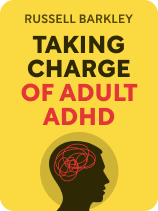

This article is an excerpt from the Shortform book guide to "Taking Charge of Adult ADHD" by Russell Barkley. Shortform has the world's best summaries and analyses of books you should be reading.
Like this article? Sign up for a free trial here.
Which higher functions does ADHD impair? How does ADHD affect your internal dialogue?
Weakened inhibitions, a spotty memory, and an impaired sense of time aren’t ADHD’s only symptoms. Dr. Russell A. Barkley says there are several other mental functions that ADHD hinders in adults.
Keep reading to learn about ADHD impairments that are challenging for adults.
Impaired Higher Functions
The higher ADHD impairments include the “inner voice” that lets you motivate yourself and work through problems, the ability to encode lessons learned into language, and the ability to learn from reading and observation.
Barkley writes that adults with ADHD have trouble engaging in internal dialogue. Self-talk plays a vital role in problem-solving, focused contemplation, and creating internal motivations for yourself. However, your tendency to react to every distraction makes it hard to think through options, evaluate outcomes, or convince yourself to engage in productive behaviors that won’t provide an immediate reward. If you can’t maintain constructive self-talk, you can’t consciously assess the consequences of different decisions. If you can’t verbally motivate yourself, you’ll struggle to start or complete tasks that require sustained effort and concentration. Instead, your inner voice may be like your outer voice, constantly flitting from one tangent to the next.
(Shortform note: Though Barkley touts the benefits of a constructive inner dialogue, for many people, self-talk is a curse. In Chatter, Ethan Kross discussed the negative side of internal dialogue that sometimes acts as an internal cynic who overwhelms and discourages you. “Beating yourself up” in this way activates your brain’s threat response, arising from the limbic system, which people with ADHD already have trouble keeping under control, as discussed previously. Kross presents several strategies for managing negative self-talk, but these may prove a particular challenge for people who already find engaging with their inner voice difficult.)
Just as ADHD impairs your memory of events, ADHD weakens your ability to remember and organize written and verbal information, such as driving directions, a list of instructions, or important details like how often to take medications. This is a problem, since if you can’t remember information, you can’t consciously act on it. Barkley states that adults with ADHD often have a hard time retaining and comprehending information that they read or hear, such as trying to follow the plot of a book or the point a speaker makes in a lecture. ADHD even inhibits your ability to learn vicariously through observation. All of this makes any style of learning problematic for adults with ADHD.
(Shortform note: While Barkley doesn’t list specific strategies to cope with these challenges, some people with ADHD find success when reading aloud or moving around while reading. Audiobooks can be beneficial for those who process verbal information better than the written word. Additionally, adults with ADHD may find it helpful to relate what they read to personal life experiences and discuss what they’ve read with others, as in a book club. Experiment with various methods to identify which strategies work best for your unique needs.)

———End of Preview———
Like what you just read? Read the rest of the world's best book summary and analysis of Russell Barkley's "Taking Charge of Adult ADHD" at Shortform.
Here's what you'll find in our full Taking Charge of Adult ADHD summary:
- The various treatment options for ADHD in adults
- How to accept ADHD as a part of your life
- What ADHD can look like in undiagnosed adults






